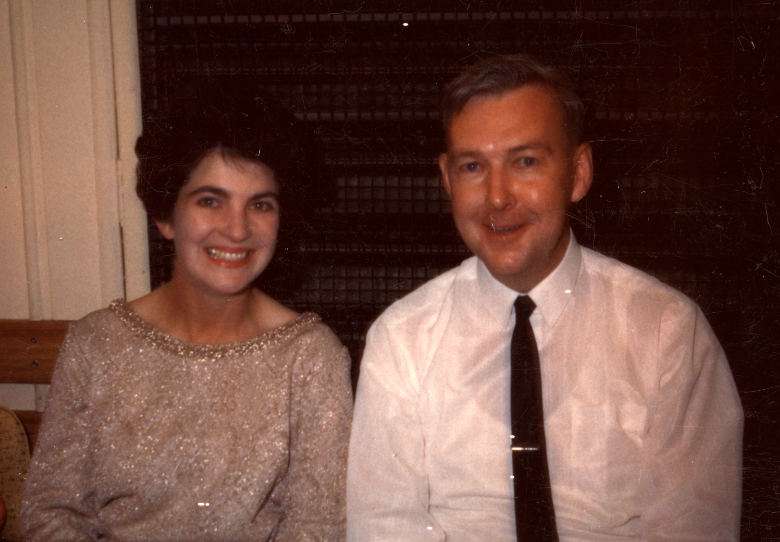
Mum and Dad in Canberra
This is a very personal post and yet I’m aware that what I’m describing here are issues and experiences that many in our community are facing, either as a support person to an elder or as a person needing care. Hopefully by writing about my family’s experience I’m highlighting issues that need to be addressed to facilitate positive change. Human rights are universal and critical here is the right of elderly people to receive effective care, and to realize their human rights and potential.
My Dad’s body is breaking down and he’s on oxygen much of the time while his mind remains razor sharp. My Mum’s memory is deteriorating while her body is in pretty good shape. Mum and Dad laugh and say they complement each other. Several times a week they say that, no matter what, they have to stay together. “I love your Father SO much,” Mum says to me at every opportunity. She may increasingly forget things, but she never forgets this important fact. “Yes, Mum, I know,” I say. When Dad needs to go to hospital to get an oxygen infusion, or for an infection, he worries about leaving Mum. “She needs me here,” he says. When I spend time with Mum while my Dad is in hospital, Mum is restless, watching the phone, waiting for a call. I distract her with movies and then the call finally comes. I can go and collect Dad. Mum lights up, her body visibly relaxing. He’ll be home soon.

Mum and Dad in Lyndoch
I’m lucky that my work has given me some family leave to spend time with my parents, while my brother and I help them to cope with the stepped-up care they need and try to figure out the residential care that we agree, as a family, is needed now.
Every time I visit Australia from San Francisco I get a dose of the world of elder care, caregivers and those receiving care. Most of the time I have more questions than answers. Often, I’m appalled at the sometimes-amateurish nature of an industry (and it IS an industry) that is responsible for the welfare and human rights of so many individuals who are old and needing increasing levels of care. And yet I know that compared to some countries (I live in the United States) Australians are the lucky ones with their health system.
That said, I’m stunned that carers of the elderly, or at least those helpers looking after my parents at home, don’t seem to be required to undergo any formal training, unlike the qualifications needed for childcare workers. Often, there are not even any protocols in place such as not talking incessantly, not hugging, touching, or kissing without having permission to do so, or a training manual as a guide. However, Mum and Dad also have helpers who are not only professional, they’re kind, compassionate, practical, and with keen observation skills. One helper in particular has become a good friend to my parents. “I don’t know how we would have coped without her,” my Mum says.
While in some roles, aged care workers are required to have a certificate in community service (Aged Care) there doesn’t seem to be a mandatory or well implemented system that would ensure there’s an agreed benchmark and set of expectations for those providing care to abide by. Now, of course, with the Coronavirus (COVID-19), there’s a health imperative for helpers to not have intimate contact with those they’re caring for.

Credit: Noah Berger
It seems that carers and health workers today need more training in infectious diseases and emergency measures to cope with climate induced bushfires and floods. Of course climate change is exacerbating the issues of caring for those who are in residential care. Those in residential care are vulnerable to fires, as the documentary, Campfire (renamed Fire in Paradise by Netflix) shows where a group of carers were left responsible for the safety and wellbeing of the elderly residents during the bushfires in California.
And now we have the Coronavirus (COVID-19) to contend with and the phenomenal caregiving challenges, especially for women. My friend Maxine tells me of her friend in Italy who is in lockdown struggling to provide for the caregiving needs of her Mother whom she adores. This speaks to the gendered impacts of the virus.
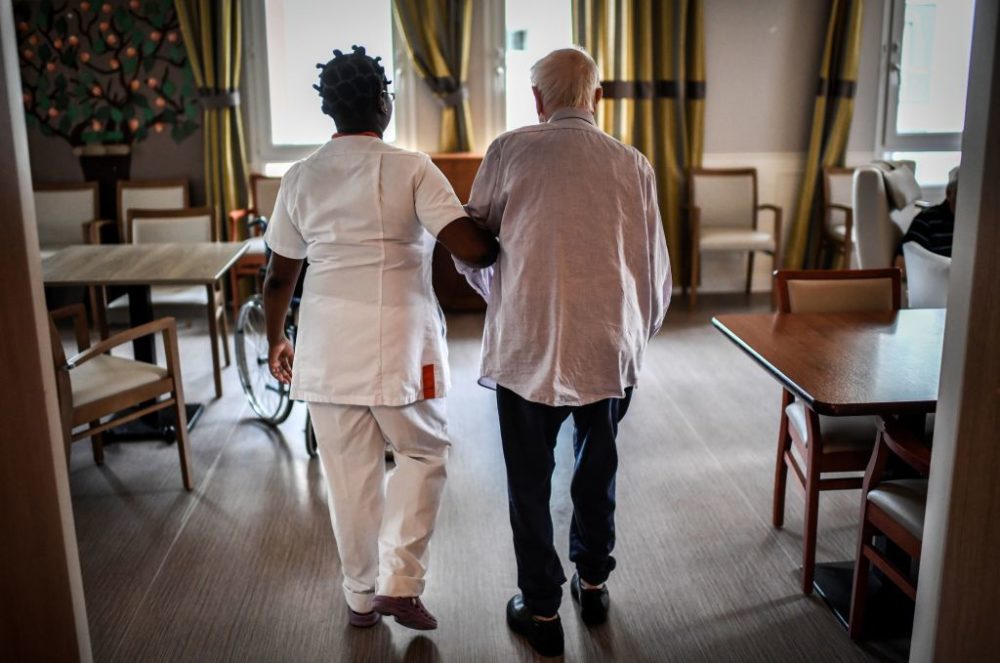
Credit: Stephane De Sakutin – Getty Images
While to date, men and women have contracted the virus in almost equal numbers, more men to date have died of the virus due to prevalence of factors such as smoking. However, as a recent article in The Lancet notes, information from the State Council Information Office in China suggests that more than 90% of health-care workers in Hubei province are women, making the predominantly female health workers extremely vulnerable to infection. They’re also exposed to sustained mental stress of dealing with death, diseases and distress of patients and their families and so require psycho-social support to help them manage stress, which is another factor contributing to susceptibility to the virus. Further, the closure of so many schools to control the Coronavirus transmission in an increasing number of countries impacts women the most since they are responsible for most of the care of children. This means their paid work opportunities and security is further compromised. Travel restrictions will further impact the mostly female domestic workers who travel within Asia and provide remittances to their families at home to support their children’s education, health and wellbeing, as well as supporting their elders.
Also, as in the case of other emergencies and pandemics, domestic violence calls have increased significantly in areas where Coronavirus is most prevalent according to this BBC Report on how the Coronavirus is particularly impacting women in Asia.
It’s critical that public health efforts address how the Coronavirus impacts women and men differently so that this can inform equitable policies and programs. Also critical is ensuring that women are contributing to the decision-making on policies and interventions so that their needs can be met, including as frontline carers. As The Lancet article notes, ‘Given (women’s) front-line interaction with communities, it is concerning that women have not been fully incorporated into global health security surveillance, detection, and prevention mechanisms. Women’s socially prescribed care roles typically place them in a prime position to identify trends at the local level that might signal the start of an outbreak and thus improve global health security. Although women should not be further burdened, particularly considering much of their labor during health crises goes underpaid or unpaid, incorporating women’s voices and knowledge could be empowering and improve outbreak preparedness and response.’
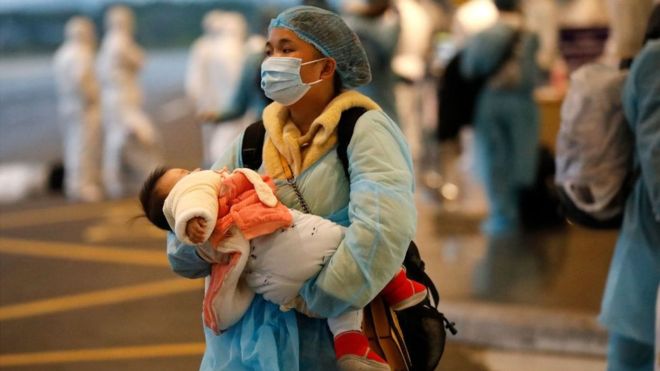
Credit: Getty Images – BBC News
All of this speaks to the critical need for gender inclusive health governance at local, national and regional levels. This includes the need for well trained, remunerated, and equipped staff and policies, responsive to the health needs of a community in a fast-changing environment.
Back with my parents, while both of them are receiving daily care from helpers, it’s not proving adequate anymore. Our Dad is pretty amazing in that, until recently, he had a weekly computer lesson from a neighbour even as Dad was in his 91st year. In a birthday thank you message to family and friends he wrote about being a “nonagenarian (Wow-is that me?).” Now it’s becoming increasingly difficult for my Dad to use the computer due to being almost blind in one eye, with limited vision in the other eye.
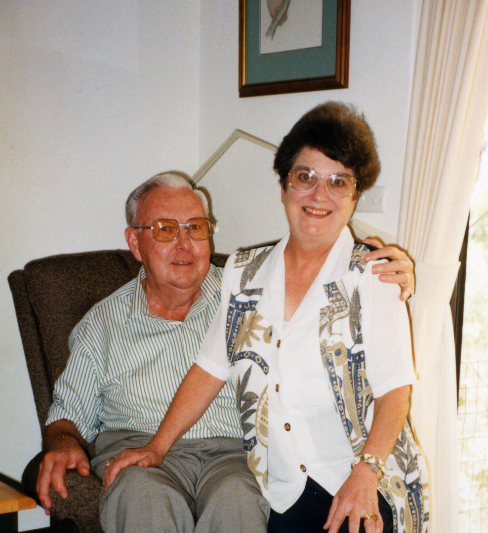
Mum and Dad Together
My brother’s and my first attempt to get our parents into residential care at a brand-new place that had the rooms they desired next to each other resulted in advice that we needed close to a million dollars. Or, if our parents had no savings they could also be admitted. Since they had modest savings they fell through the cracks – their savings became a disadvantage. Or at least that was the view at the time, since it took 12 weeks for the government to send a letter with its own assessment, and even after that, the government sent a revised ‘reassessment’ letter. It seemed to suggest that the system was complex, even for the bureaucrats administering it.
“How would we cope if we didn’t have you both to help?” our Dad asks, shaking his head.
I wonder that too, especially for people at the start of this whole process of securing help in their homes. The most recent figures from a January 2020 report from the Productivity Commission in Australia shows that those Australians waiting for the highest-level home care package have an average wait of 34 months. For home care packages the wait times range from seven months for a level 1 package to 34 months for a level 4 package. The total number of people on the home care package wait list currently sits at over 129,000.
For those people whose needs are beyond home care and for whom residential care is required, it’s an even more challenging process. The documents required to be completed for residential care are complex, including the online financial forms, even complex for my brother who has an accountancy background and an MBA.
I think about those older people who aren’t computer savvy in a world that increasingly demands online literacy. That includes our Mum who has never been interested in computers and social media. For her, the world of books keeps her in thrall. Even for those who are computer literate, the government websites aren’t user friendly. Then there are the many people with very limited mobility who are now required to go to a Centrelink office to prove their identity when registering for a new allowance, even when they receive a pension and have been in the government database for years. In my parents’ case, when I took them to do this a year ago, it took four visits before the verification process was complete.
It seems like the best solution would be for Centrelink to partner with organizations that already provide home based services to elderly people and people with disabilities. In this way, if verification is required, it could be part of a mobile service rather than requiring people in wheelchairs, with dementia, and people needing oxygen, to spend long periods of time waiting in Centrelink offices to meet with an officer.
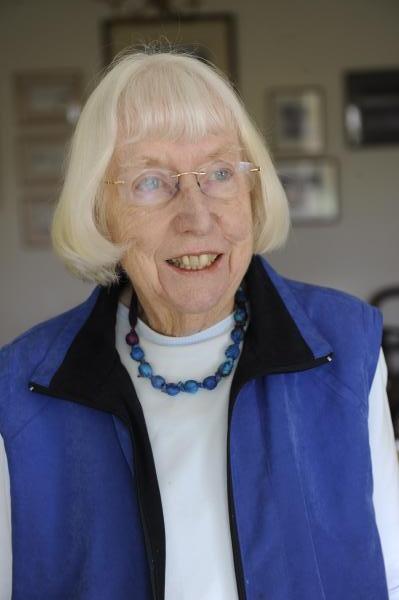
The Royal Commission into Aged Care in Australia resulted in heart wrenching testimony from many people including from Merle Mitchell who shared her own insider experience.
Merle Mitchell
Credit: Stewart Chambers
Dignity is at the heart of what’s needed. A values-led approach. I think back to the popular ABC series, Old People’s Homes for 4 Year Olds and the joy of this approach of bringing children into the lives of elderly people living in a home. I think of how much my parents appreciated the program too.
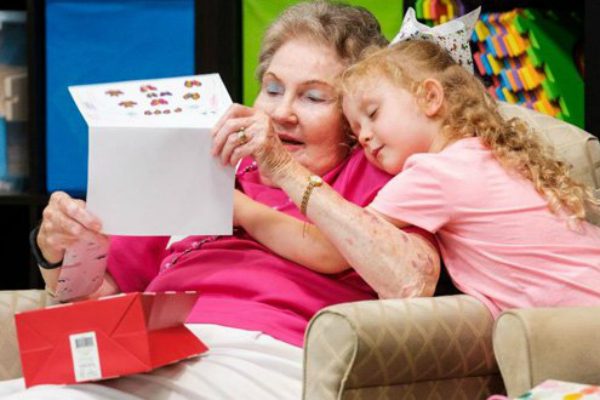
Credit: Caroline Egan
It infuriates me when I hear people at supermarkets, cafes and aged care centers, call my parents, and other people who are old, “sweetie”, “dearie”, “luv”, or worse, as a stranger, call them by their first name as if they’ve lost the right to be addressed more formally now that they’re old. I look at my Dad. He’s lived a big life, including working in the Prime Minister’s office, responsible for Australia’s security around the world. Who climbed a tree to rescue me as a kid even though he suffered from vertigo. My Mum, who with her friends, started a ballet school for children when she was in her early 20s before becoming a comptometrist. Who instilled in me a love of history and reading.
When I take my Dad to a medical appointment, I put his walker into the boot/trunk and go to drive and then we’re back to Dad-Daughter territory. “Turn left, keep in this lane.” “Best to stay on this side of the road.” “Watch out for that truck up ahead as it may be turning.”
“You’ll miss it when you don’t have those drives with your Dad anymore,” my friend Kerin says when I share this experience with her. She’s right.
One morning I find my Dad outside looking at his plants. “Dad, what are you doing outside without your oxygen? It’s a really hot day and you need to be inside,” I say. “The plants need watering and I can’t do it,” Dad says. The plants need water and oxygen, just like me, he seemed to be saying. I took the hose (“turn the dial to rainshower”, he said) and started watering the plants. A big smile broke over Dad’s face as he sat in his walker watching the stream of water give life to the plants.
With my Dad now increasingly sleeping during the day and needing more oxygen, my Mum relishes excursions outside, and yet, she’s watchful about not spending too much time away from home either.
We go somewhere nearby for lunch. “I will only go to a nursing home if I can be with your Dad,” she says determinedly. Then, a few minutes later, “What will I do without your Dad, how will I cope?” Eyes fill with tears. Spilling down her face. “I’m sorry, I’m sorry.” Rubbing her tears away, embarrassed that others may be watching. I do my best to reassure her. “Don’t worry, so many people have allergies at present that they’ll think that’s what you have.” “And, of course we’ll ensure that you and Dad are together when you go to residential care.” Yet, I know how Mum is feeling. Anticipatory grief. I understand this because I returned to a therapist I hadn’t seen for 20 years for the same reason. I was used to her being more of a sounding board 20 years ago. This time she is more direct. The messages I come away with are essentially, guilt is corrosive. You’re doing all you can. You’re also doing important work in the world and it would be a mistake to give it all up to return from the US to Australia to care for your parents when you’re arranging care for them and you return as often as you can.

Mum, Jane, and David in the snow
I realize there’s no right or wrong way to navigate this territory. It’s more about my acceptance of the decisions I make. I know I want to spend as much time with my parents because I love them and enjoy their company, while also keeping the job I love. I love my parents, my brother, my family, my friends, Adelaide, Sausalito, my job, my boat. “You dwell in complexity,” my friend, Kerin says. I know she’s right.
My brother and I recognize how important it is for Mum and Dad to continue to make as many decisions as they can without our making them on their behalf, until they give us permission to do so. However, our Dad is increasingly asking us to do this. “I’m so tired. I need you to do this. I’m just needing to sleep all the time. I know I’ll need high dependency care once we decide on the residential care facility.” I feel lucky that my brother lives close to my parents and that we get on well and yet I realize it’s not fair for him to carry the burden. He’s also traveling in a big job that is stressful and demanding. We agree we need more help.
A woman whose place I’m staying in recommends a care broker and so my brother and I meet with this woman. Finally, we feel we’re talking to someone who has years of experience in this terrain. We arrange for her to meet with our parents so she can help to find the right residential care facility for their needs. This time we have the Centrelink assessment. She says she’ll re-check the figures and the advice from Centrelink. Like her, we’re still cautious of the assessment.

Mum and Dad Darwin
“We need a place that has two rooms next to each other for our parents,” I say to the broker. “Well, that means we’ll essentially be looking for a place where two people in rooms next to each other have just died,” she responds. “Very rare.” Best we can do is try to find two rooms on the same floor. Once they’re in we can prioritize their moving closer to each other. It seems that residential care isn’t set up to easily accommodate couples. If they move into a double room and one of them dies, then the other would find themselves sharing a room with a stranger. “That’s not going to happen,” says my Mother. “I’m not sharing a room with a stranger.”
A few days later, with the Coronavirus spreading rapidly, my Dad says “Maybe we should wait a few months given the Coronavirus. They say it’s going to peak in May. Perhaps we should wait until after that?” Two people in residential care in Australia have already died of the virus. Yet we know that residential care institutions are tightening security and preparing for lockdown in the wake of the Coronavirus. We learn that people are toe-tapping greetings in place of hugs or handshakes. When I next arrive to see my parents, my Mum gives me a hug, as normal. I inhale her scent. It’s Mum’s scent. I would know it blindfolded. Reassuring. Precious.
Five days later the broker says she thinks she’s found a place. We’ll need to act quickly.
“Will you buy an anniversary card for me to give Mum?” Dad asks me. “Yes, of course,” I say. “And for Mum to give you, I ask? “Yes.” Dad says. “How many years is it?” asks my brother when we’re all having lunch together. “Fifty-eight years.” “Fifty-eight long, long, long years,”, I tease, resurrecting a long-standing family joke. “Not so long,” Dad says now. Mum and Dad smile at each other across the table. Things are changing fast, there are so many unknowns, and yet — and yet — they still have each other.

Mum and Dad Wedding Day
If we want a beloved community, we must stand for justice.
– bell hooks